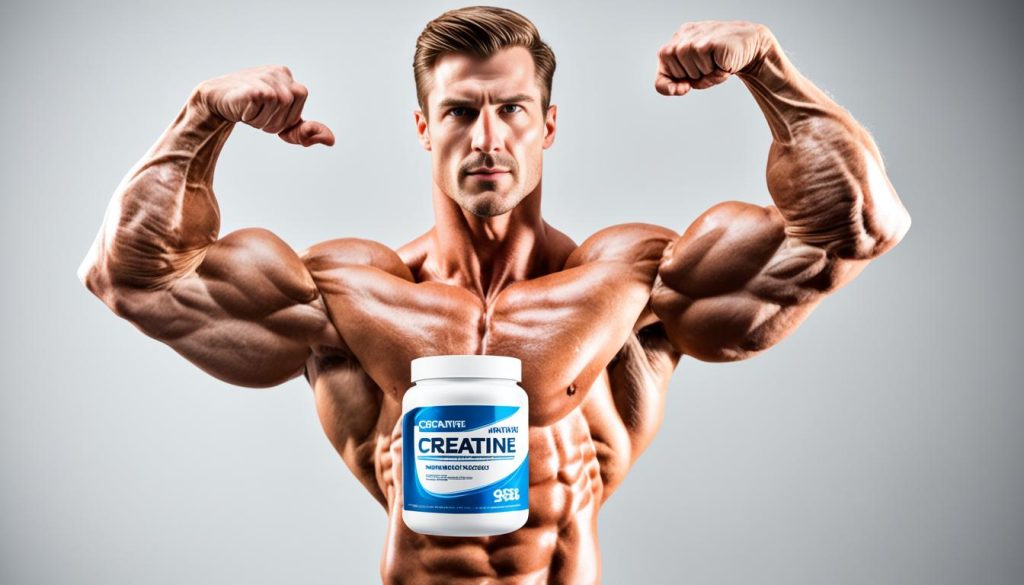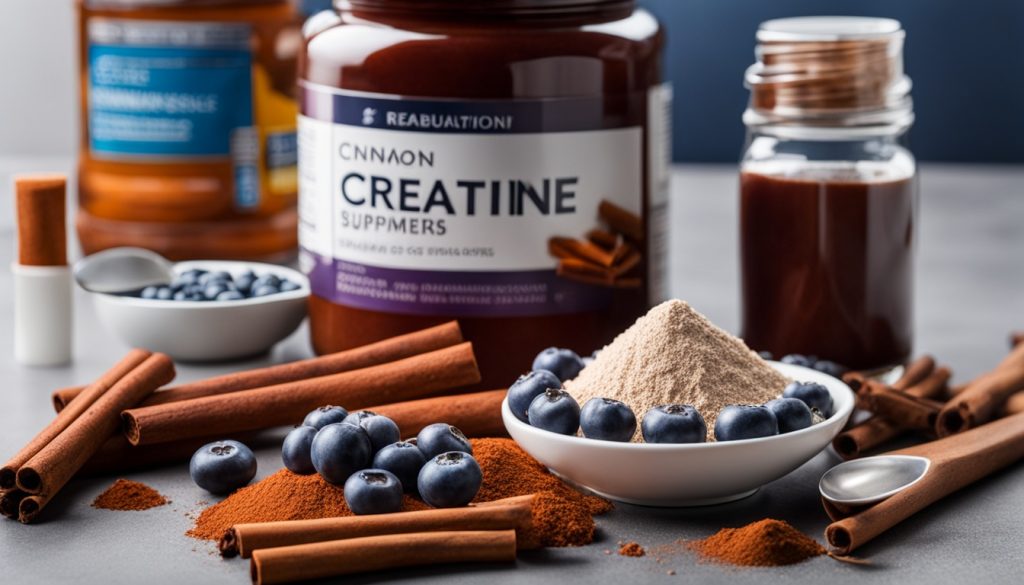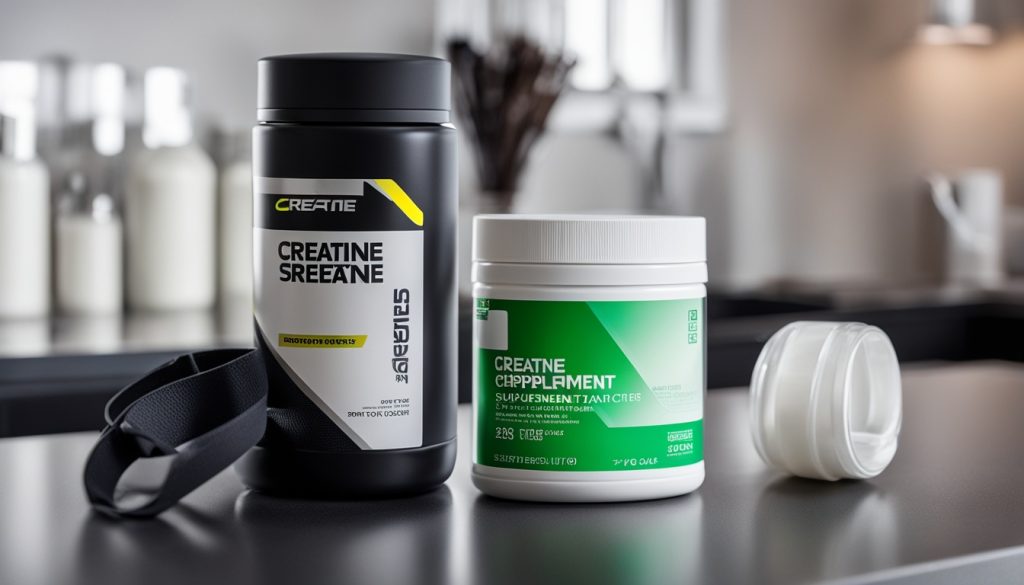Did you know over 70% of studies show creatine helps with high-intensity exercise? This powerful stuff can make your workouts better, increase energy, and help your health in the long run. Creatine helps refill ATP, the energy your cells use. This lets you work harder and recover quicker.

If you’re an athlete or just want to get better at fitness, creatine is a great choice. It’s a natural supplement backed by science. We’ll look into how creatine works, its benefits for sports, muscle growth, and health. Plus, we’ll give you tips on how much to take and how to use it.
What is Creatine?
Creatine is a natural substance in our bodies. It helps make energy in our muscle cells. It comes from the liver, kidneys, and pancreas. Then, it goes to our muscles as phosphocreatine.
Natural Source of Energy
Our diet gives us half of the creatine we need. Foods like red meat, seafood, and dairy have a lot of it. The other half is made inside us. Creatine turns food into energy, which is called ATP.
Primary Role in Energy Production
Creatine is key in keeping ATP levels up. ATP is what powers muscle movements and helps us do hard exercises. Creatine helps make more ATP in muscles. This means we can work out better and get stronger.
Research shows creatine supplements help with muscle size, strength, and exercise performance. It’s a top choice for athletes and anyone wanting to boost muscle health.
Creatine and High-Intensity Exercise
Creatine is a top supplement for boosting performance in high-intensity workouts. Studies show it works well, with most showing a 1-15% improvement.
Improved Sprint Performance
Creatine makes you faster in 40-meter sprints. It’s great for athletes in sports like football, soccer, and track and field. They need quick bursts of speed.
Enhanced Power and Strength
Creatine also boosts cycling power and helps in sprint and jumping in team sports. It increases phosphocreatine, a key energy source. This means athletes can train harder and perform better.
Many studies prove creatine helps in high-intensity workouts. In one study, 43 college men took creatine. They did 16% better than those who didn’t take it in exercises.
Creatine is key for athletes and those who love intense workouts. It boosts power, strength, and speed. With creatine, you can reach your goals and push your limits.
Benefits of Creatine for Strength Training
Are you looking to get better at your workouts? Creatine might be what you need. It’s a natural substance that helps athletes do their best. Many people use it to improve their fitness and compete better.
Creatine makes you stronger in exercises like lifting weights, squatting, and bench pressing. It can make your muscles grow more. Studies show it can increase testosterone levels by 20%, not just 5% without it.
This supplement also helps you do more explosive moves and lift more times. So, you can get stronger and bigger muscles. This helps you break through barriers and reach your fitness goals.
Creatine comes from foods like meat, fish, chicken, and dairy. Taking supplements adds more to your body. This means better performance and longer workouts. Young and healthy people get the most benefits from it.
If you want to get stronger and do better in your workouts, think about using creatine. But talk to a doctor or a dietitian before starting any new supplements.
Creatine’s Impact on Muscle Growth
Creatine is a top choice for building muscle and getting stronger. It’s a natural substance that starts many cell actions. These actions help make new muscle.
Increased Muscle Mass
Creatine helps make more proteins that make muscle fibers bigger. This means more muscle growth. It also raises insulin-like growth factor 1 (IGF-1), a hormone that helps muscles grow.
Also, creatine makes muscles hold more water. This makes muscles look bigger fast. You can see your muscles get bigger.
Boosted Lean Body Weight
Many studies show creatine makes lean body weight go up. This is because it helps muscles grow and hold more water.
A study by Nunes et al. (2017) found creatine made muscles in the upper arms grow more in men who lift weights. Another study by Yáñez-Silva et al. (2017) showed creatine helped young soccer players get stronger.
So, creatine is a great choice for building muscle and getting leaner. It works by making cells work better and keeping muscles hydrated. This helps people reach their fitness goals faster.
Potential Neuroprotective Effects
Creatine is a popular sports supplement. It may help more than just athletes. It could protect the brain, helping with Parkinson’s disease and other brain issues.
Parkinson’s Disease
Studies on mice with Parkinson’s disease found creatine helps a lot. It kept dopamine levels high, which is key to fighting the disease. When mice took creatine and lifted weights, they got even better at moving and doing daily tasks.
Other Neurological Disorders
- Research on animals shows creatine might help with diseases like Huntington’s, Alzheimer’s, stroke, epilepsy, and ALS.
- Creatine keeps brain cells strong, lowers stress, and helps with brain inflammation.
These studies are still growing, but they look promising. Creatine could be a big help for brain health. Always talk to a doctor before taking creatine, especially if you have other health issues.
Creatine and Blood Sugar Regulation
Creatine is a popular supplement for athletes and bodybuilders. It may also help people with blood sugar issues. Studies show it can lower blood sugar by improving how muscles take in sugar.
A 12-week study showed creatine and exercise worked better for blood sugar after eating a lot of carbs. This means creatine could help with sugar metabolism and make insulin work better.
A study in the Journal of Diabetes Science and Technology in 2011 found creatine helped people with type 2 diabetes. They took 5 grams of creatine a day for 5 days. This improved their blood sugar and made their muscles stronger.
Another study in the Journal of Strength and Conditioning Research in 2013 also found good results. People with type 2 diabetes took creatine for 5 days and then 5 grams a day for 8 weeks. They got stronger muscles and moved better without their blood sugar getting worse.
These studies look promising, but we need more research. Doctors and people with diabetes should be careful with creatine. They should watch their blood sugar closely if they think about taking it.

| Study | Findings |
|---|---|
| Journal of Diabetes Science and Technology (2011) | Individuals with type 2 diabetes who consumed 5 grams of creatine daily for 5 days experienced improved blood sugar control and an increase in lean body mass. |
| Journal of Strength and Conditioning Research (2013) | Taking creatine supplements (20 g/day for 5 days and then 5 g/day for 8 weeks) was well-tolerated by individuals with type 2 diabetes, resulting in enhanced skeletal muscle strength and physical function without impacting glycemic control. |
| PLoS One (2017) | A systematic review and meta-analysis of 14 randomized controlled trials revealed that creatine supplementation can enhance glycemic control and reduce insulin secretion in people with type 2 diabetes. |
Brain Function and Cognitive Benefits
Creatine is known for boosting physical performance. But, it also helps brain function and cognitive skills. Studies show it can improve memory, intelligence, and fight cognitive decline as we age.
Memory and Intelligence
Creatine supplements can make memory and recall better. They help vegetarians, who often have less creatine. Creatine is key for brain energy. It boosts phosphocreatine and ATP, the brain’s energy source.
Age-Related Cognitive Decline
Our thinking skills can get worse as we get older. But, creatine might slow this down. It supports brain energy and flexibility, helping keep cognitive function sharp.
Research on creatine and brain health looks good. It suggests creatine can enhance memory, intelligence, and brain strength. This is especially true for people with low creatine levels or aging concerns.
Reducing Fatigue and Tiredness
Creatine supplements help reduce fatigue and tiredness. In a 6-month study, people with brain injuries who took creatine felt 50% less dizzy. Only 10% felt tired, while 80% in the control group did.
Creatine also helps when you exercise in the heat or haven’t slept well. It made high-intensity exercise 15% better.
For people getting over COVID-19, creatine can be very helpful. About 45% of people feel tired a lot after getting over COVID-19. A study found creatine helped make these people feel less tired.
After 3 months of taking creatine, people felt better. They had more creatine in their muscles and less pain. Only a few people felt a little sick, but it went away quickly.
| Metric | Value |
|---|---|
| Study duration | 6 months |
| Creatine dosage | 4 g per day |
| Percentage of patients with PVFS after COVID-19 recovery | Approximately 45% |
| Number of participants | 12 |
| Age range | 18-65 years |
| Fatigue levels (MFI-20 scores) | 43.5 or higher |
| Time to observe fatigue improvements | 3 months |
| Increase in tissue creatine levels | Significant in case group |
| Reported side effects | Mild transient nausea in one participant |
In conclusion, creatine is a good way to fight fatigue and tiredness, especially after COVID-19. It boosts energy, cuts down on dizziness and pain, and makes you feel better overall.
Creatine: Safe and Effective Supplement
Creatine is a safe and well-studied supplement. It has been looked at for over 200 years. Many studies show it’s safe for healthy people to use for a long time.
Long-Term Safety Profile
Studies lasting up to 5 years show no bad effects from taking creatine. You can take 3-5 grams of creatine powder each day. This is a natural way to help your sports performance and health.
- Creatine is made by the body, mainly in the liver, pancreas, and kidneys.
- You can get creatine from food like seafood and red meat, but supplements have more.
- Taking creatine helps with strength, muscle size, and doing high-energy activities.
- Using creatine for up to 5 years is safe and okay for healthy people.

Creatine might make you a bit heavier, but it’s mostly more muscle. It’s seen as safe and helpful for athletes and anyone wanting to do better in sports and daily tasks. With its safety and benefits, creatine is a good choice for a healthy life.
Dosage and Timing
When taking creatine, creatine monohydrate is the best form. It helps fill up your muscle creatine fast. You should take 20-25 grams a day, split into 5-gram doses, for 5-7 days.
Then, take 3-5 grams a day to keep your creatine levels up. This keeps the benefits going.
Taking creatine with food, like protein or carbs, helps it work better. It doesn’t taste or smell, so it’s easy to mix with water or drinks. When you take creatine doesn’t really matter for its effectiveness.
Loading Phase
The loading phase quickly fills up your muscle creatine. By taking 20-25 grams a day for 5-7 days, you can boost your creatine levels by 10-44%. This is faster than taking a small dose every day.
Maintenance Dose
After loading up, take 3-5 grams of creatine a day to keep your levels high. This dose is enough to keep the benefits going, even if you miss a day or two.
Being consistent with creatine is important. Stick to the right loading and maintenance doses to get the most out of this helpful supplement.
Types of Creatine Supplements
There are many kinds of creatine supplements out there. But, creatine monohydrate is the most common and well-studied type. It’s proven to help with exercise and muscle growth.
Creatine monohydrate can boost muscle creatine by up to 40%. This makes it great for short, intense workouts. It’s also the cheapest and easiest to find creatine type.
Other types like creatine hydrochloride (HCl), creatine ethyl ester, and creatine magnesium chelate exist too. But, they don’t have as much research or benefits as creatine monohydrate.
- Creatine HCl might be more soluble, but we don’t have human studies to prove it’s better.
- Creatine ethyl ester didn’t work as well as creatine monohydrate in studies.
- Creatine magnesium chelate was as good as creatine monohydrate in tests, but it’s not seen as better.
Then there are buffered creatine, liquid creatine, creatine phosphate, Kre-Alkalyn, creatine nitrate, creatine malate, and creatine pyruvate. But, we don’t have as much proof they work as well as creatine monohydrate.
In short, creatine monohydrate is the top choice for boosting exercise, muscle, and overall performance. It’s the most studied and effective type.
Creatine for Endurance Athletes
Creatine is known for helping with short, intense workouts. But, its role in endurance sports is still being studied. Endurance athletes do low-intensity activities for a long time. They might not see as big of a boost from creatine as those doing power and strength workouts.
Endurance sports don’t need quick ATP recovery as much. This is where creatine usually helps a lot. But, creatine might still help endurance athletes by making their training better. They might do more intervals or train harder.
Creatine and Endurance Performance
Creatine might not boost endurance directly. But, it can help in other ways:
- Increased Muscle Power and Strength: Taking creatine can make muscles stronger and more powerful. This is good for high-intensity parts of endurance sports.
- Delayed Fatigue Onset: Creatine can make athletes feel less tired. This means they can keep going harder for longer during training and races.
- Improved Recovery: Creatine helps athletes recover faster after hard workouts. It reduces muscle damage and gets athletes back to training quicker.
- Cognitive Benefits: Creatine can also help with thinking and decision-making. This is useful for athletes in long events.
How creatine affects endurance athletes can differ. It depends on things like age, sex, and exercise type. Always talk to a doctor before trying creatine.
In summary, creatine might not boost endurance directly. But, it can help in other ways. It can improve muscle power, delay tiredness, help with recovery, and improve thinking. Creatine can be a good choice for endurance athletes looking to improve their performance.
Creatine: A Comprehensive Performance Booster
Creatine is a top choice for athletes and fitness lovers. It helps make energy in the body. This makes it great for those who work out a lot.
Research shows creatine has many benefits. These include:
- Improved sprint performance by giving more energy for intense workouts
- Enhanced power and strength by increasing muscle creatine levels
- Increased muscle mass and lean body weight with weight training
- Potential neuroprotective effects, which could help with brain disorders
Creatine is safe and works well, with lots of studies backing it up. It’s also not too expensive. So, many athletes and fitness fans can use it.
To use creatine, start with 10-20 grams a day for a few days. Then, take 2-5 grams daily to keep up the good work. This helps you get the most out of it.
Creatine does more than just help in sports. It might also boost brain function, keep your mind sharp, and help control blood sugar. So, it’s good for your overall health and fitness.
If you’re into sports or just like to stay fit, adding creatine to your routine can really help. It boosts energy, strength, and muscle size. This makes it a key part of any workout plan.
Creatine for Endurance Athletes
Creatine is not just for power and strength. It also helps endurance athletes. It makes it easier to do more intervals and training, which helps with endurance performance.
Endurance athletes get the most from creatine with high-intensity training. It cuts down on inflammation after races, helping marathon runners. It also helps athletes stay cool when it’s hot outside.
When you eat carbs with creatine, it helps store more glycogen. This boosts endurance performance. Creatine also lets you keep going longer during hard workouts by slowing down the body’s energy use.
Vegetarian and vegan endurance athletes might gain a lot from creatine. They often don’t eat as much meat, which is where most creatine comes from. Creatine supplements make sure they get enough of this important nutrient.
| Key Benefits of Creatine for Endurance Athletes | Supporting Research |
|---|---|
| Decreased inflammation post-race | Santos et al. |
| Improved thermoregulatory response in hot conditions | Kreider et al. |
| Increased glycogen storage when combined with carbohydrates | Nelson et al. |
| Delayed anaerobic glycolysis and reduced hydrogen ion/ammonia accumulation | Stout et al. |
| Greater benefits for vegetarian/vegan athletes | – |
Conclusion
Creatine is a top choice for boosting athletic performance and muscle growth. It also helps with brain function. The best kind, creatine monohdrate, works best when taken in a loading phase and then a maintenance dose.
This supplement is safe and easy to get. It’s also one of the cheapest ways to improve your performance. Creatine is backed by lots of science.
Studies show creatine helps with many health and fitness goals. It makes high-intensity workouts better and helps muscles grow. It also boosts brain power and might protect the brain.
Creatine makes more energy, cuts down on tiredness, and helps control blood sugar. This makes it a great all-around performance booster.
Scientists are still learning more about creatine. But it’s clear it’s a great choice for athletes and anyone wanting to get healthier. Creatine is safe and works well. It’s a top pick for anyone wanting to do better in sports or just feel better overall.

